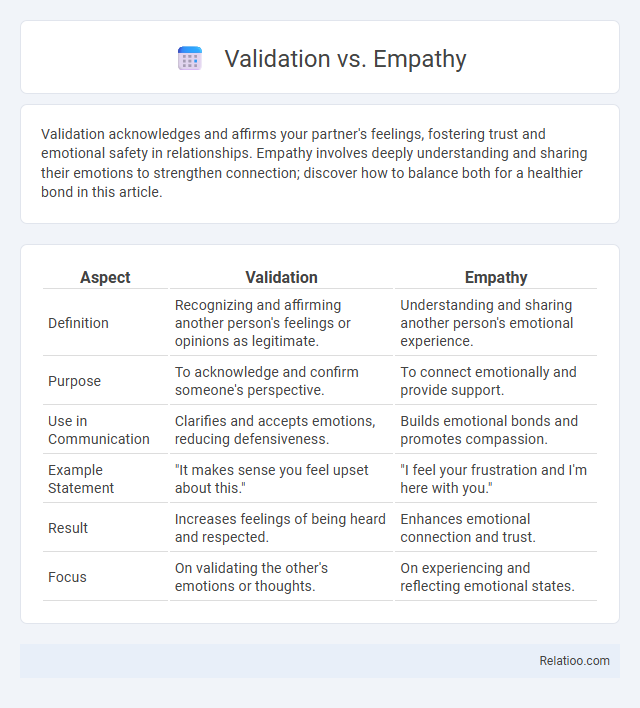Validation acknowledges and affirms your partner's feelings, fostering trust and emotional safety in relationships. Empathy involves deeply understanding and sharing their emotions to strengthen connection; discover how to balance both for a healthier bond in this article.
Table of Comparison
| Aspect | Validation | Empathy |
|---|---|---|
| Definition | Recognizing and affirming another person's feelings or opinions as legitimate. | Understanding and sharing another person's emotional experience. |
| Purpose | To acknowledge and confirm someone's perspective. | To connect emotionally and provide support. |
| Use in Communication | Clarifies and accepts emotions, reducing defensiveness. | Builds emotional bonds and promotes compassion. |
| Example Statement | "It makes sense you feel upset about this." | "I feel your frustration and I'm here with you." |
| Result | Increases feelings of being heard and respected. | Enhances emotional connection and trust. |
| Focus | On validating the other's emotions or thoughts. | On experiencing and reflecting emotional states. |
Understanding Validation: Definitions and Key Concepts
Validation refers to recognizing and affirming another person's emotions, thoughts, or experiences as understandable and meaningful, which fosters trust and communication. Empathy involves deeply understanding and sharing another's feelings, allowing for emotional connection and support. The distinction lies in validation confirming the legitimacy of experiences, while empathy emphasizes emotional resonance, both critical for effective interpersonal relationships.
What is Empathy? Unpacking the Essentials
Empathy is the ability to understand and share the feelings of another person, enabling deeper emotional connection and support. You can foster empathy by actively listening and responding with genuine concern, which helps validate the other person's experiences without judgment. Distinguishing empathy from validation is essential: empathy involves experiencing emotions alongside someone, while validation acknowledges their feelings as real and important.
Core Differences Between Validation and Empathy
Validation acknowledges and accepts Your feelings as understandable reactions to experiences, providing reassurance and reducing emotional distress. Empathy involves deeply sensing and sharing another person's emotional state, creating connection through understanding feelings from their perspective. The core difference lies in validation affirming emotions as valid, while empathy immerses in the emotional experience to foster relational closeness.
Why Validation Matters in Communication
Validation in communication acknowledges and respects Your feelings and perspectives, fostering trust and openness. Empathy enhances this by deeply understanding and sharing emotions, creating a supportive connection. Validation matters because it reduces defensiveness, promotes active listening, and strengthens relationships through mutual respect.
The Role of Empathy in Building Relationships
Empathy plays a crucial role in building relationships by allowing individuals to understand and share the feelings of others, fostering trust and emotional connection. Unlike simple validation, which acknowledges others' emotions as true or reasonable, empathy involves deeper emotional resonance and perspective-taking, strengthening interpersonal bonds. This empathetic engagement promotes open communication and mutual respect, essential components for sustaining healthy and meaningful relationships.
Validation vs Empathy: When to Use Each Approach
Validation involves acknowledging and accepting another person's feelings or thoughts as understandable and legitimate, which helps foster trust and reduces emotional tension. Empathy goes further by actively trying to understand and share the emotions and experiences of another person, creating deeper emotional connections and support. Use validation when someone needs assurance that their feelings are recognized as reasonable, and apply empathy when the goal is to connect on an emotional level and provide comfort or encouragement.
Real-Life Examples: Validation and Empathy in Action
Validation involves acknowledging and accepting another person's feelings or experiences as legitimate, often seen when a therapist reflects a client's emotions without judgment. Empathy requires understanding and sharing the feelings of others, exemplified by a friend comforting someone who just lost a loved one by actively listening and expressing genuine concern. In real-life scenarios, combining validation and empathy strengthens relationships, such as a manager recognizing an employee's frustration about workload while showing sincere understanding and support.
Common Misconceptions About Validation and Empathy
Validation is often mistaken for agreement, but it simply means acknowledging another's feelings as real and important without necessarily endorsing their viewpoint. Empathy involves deeply understanding and sharing the emotions of others, yet it's not the same as validation since you can empathize without explicitly affirming someone's experience. Your ability to distinguish these concepts enhances emotional communication and reduces common misunderstandings in personal and professional relationships.
Benefits of Combining Validation with Empathy
Combining validation with empathy enhances emotional connection by acknowledging feelings while genuinely understanding the person's experience. This approach reduces defensiveness, promotes trust, and fosters a supportive environment essential for effective communication and conflict resolution. Integrating both techniques improves relationship satisfaction and psychological well-being, as validated and empathized individuals feel heard and valued.
Practical Tips: Cultivating Validation and Empathy Skills
Cultivating validation and empathy skills requires active listening and acknowledging others' feelings without judgment, creating a safe space for open communication. Practical tips include reflecting emotions back to the speaker, using affirmative language, and asking open-ended questions to deepen understanding. Consistent practice in recognizing emotional cues enhances connection and fosters trust in relationships.

Infographic: Validation vs Empathy
 relatioo.com
relatioo.com